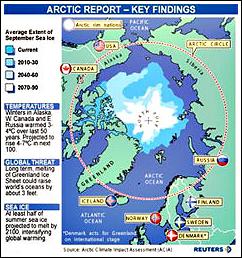Grim Signs. . .
Global Warming Is Real - It Is Here - Now.
Two reports released this week
"Observed Impacts of Global Climate Change in the U.S."
by the Pew Center on Global Climate Change, an independent, nonprofit and nonpartisan organization
and "Arctic Climate Impact Assessment"
by the Arctic Council, an intergovernmental body involving eight nations -- Canada, Denmark, Finland, Sweden, Iceland, Norway, Russia and the United States -- and six indigenous peoples' organizations.
= = = = = = = = = = = = = = = = = = = = = = = = = = = = = = = = = = = = =
Grim Signs Mark Global Warming
by Stephen Leahy, Wired News, Nov 10, 2004
Global warming has disrupted the lives of dozens of types of animals, birds and insects in the United States and will soon make the Arctic nearly unrecognizable, according to two reports released this week.
The reports document sweeping "you-can-see-them-with-your-own-eyes" ecological changes underway and offer dire predictions of massive species extinctions, an elevation of sea level
 | by 3 feet and widespread disruptions to Earth's
life-support systems. These dramatic changes should be a wake-up call to reduce greenhouse gas emissions and bolster efforts to conserve American wildlife and natural habitat, said Eileen Claussen, president of the Pew Center on Global Climate Change, an independent, nonprofit and nonpartisan organization that commis- sioned the Observed Impacts of Global Climate Change in the U.S. report. "Continued climate change could drastically alter the U.S. natural landscape," said Claussen. Half of the approximately 150 wild plants, animals |
Half of the approximately 150 wild plants, animals and insects scientists examined have been affected by global warming. "This is a surprisingly high number," said report co-author Camille Parmesan of the University of Texas at Austin.
It's the first look at climate change's impact on U.S. wildlife, and the report shows that global warming is "changing life in your own backyard," said Parmesan.
Global warming is blamed for the 1-degree Fahrenheit temperature increase in the United States over the past 100 years. This warming is uneven, however: Alaska has warmed 4 to 7 degrees in just the past 50 years.
Many wild plants and animals are going extinct in the southern edges of their ranges, but doing better at the northern edge, said Parmesan. Edith's checkerspot butterfly, for example, is in sharp decline near the Mexico-California border where it has become too warm and dry. But its numbers are expanding in British Columbia, which used to be too cold for the butterfly.
In a similar fashion, the red fox is heading north and can now be found in Arctic regions where winters have become less severe. That's bad news for the cold-hardy arctic fox, because it can't compete with its larger, more aggressive cousin.
Meanwhile, tropical species are moving into Florida and the Gulf Coast. "People are seeing many, many new species coming up from Mexico and the Caribbean," Parmesan said.
Similar changes are happening to wildlife the world over, said Parmesan, who published a study on global warming's impact on 1,500 species globally in 2003.
"Small levels of climate change have (already) had strong impacts on the natural world," she said.
But it could get much worse. As much as a third of all species will be extinct by 2050 by some estimates, said report co-author Hector Galbraith of Galbraith Environmental Sciences and the University of Colorado at Boulder.
Galbraith said he also worries that entire ecosystems are being affected, which could disrupt soil creation, plant pollination and the natural cleaning of water and air. "Climate change has the potential to affect all those benefits that we get for free."
The damage is most evident in the Arctic regions, according to the Arctic Climate Impact Assessment, an unprecedented four-year scientific investigation.
Polar bears, walruses and some seals are on their way to extinction, warns the report, which was released Monday at an international science meeting in Reykjavik, Iceland. Summer sea ice may disappear entirely and, combined with a rapidly melting Greenland ice sheet, will likely help raise the world's sea levels 3 feet by 2100, swamping homes from Florida to Bangladesh.
Average winter temperatures in Alaska and the rest of the Arctic are projected to rise an additional 7 to 13 degrees over the next 100 years because of increasing emissions of greenhouse gases from human activities, said the report.
The assessment was commissioned by the Arctic Council, an intergovernmental body involving eight nations -- Canada, Denmark, Finland, Sweden, Iceland, Norway, Russia and the United States -- and six indigenous peoples' organizations.
The area is warming twice as fast as anywhere else because of global air circulation patterns and natural feedback loops, such as less ice reflecting sunlight, leading to increased warming at ground level and more ice melt. Native peoples' ways of life are being threatened as well. Animal migration patterns have changed, and the thin sea ice and thawing tundra make it too dangerous for humans to hunt and travel.
The Arctic Council wanted the scientific study and policy recommendations to be released at this week's meeting in Reykjavik, but the latter has been delayed until Nov. 24, said Susan Joy Hassol, author of the Arctic Climate Impact Assessment report. Although unwilling to explain the reason for the delay, Hassol said that seven of the eight Arctic nations had agreed to the recommendations some time ago.
When asked about the Arctic climate policy report, Claussen said the U.S. government does not want to see strong policy recommendations. "They prefer to stick with their own policies," she said, and she doesn't expect any major changes in the Bush administration's policies on global warming.




0 Comments:
Post a Comment
<< Home